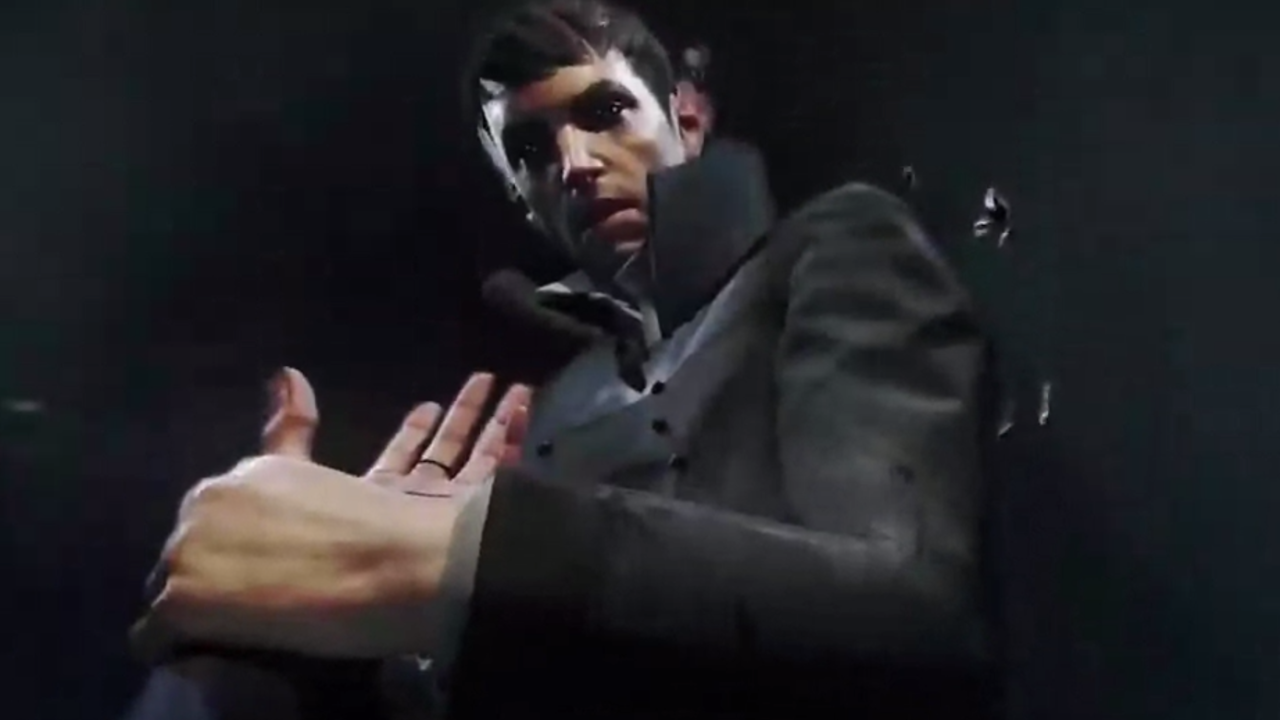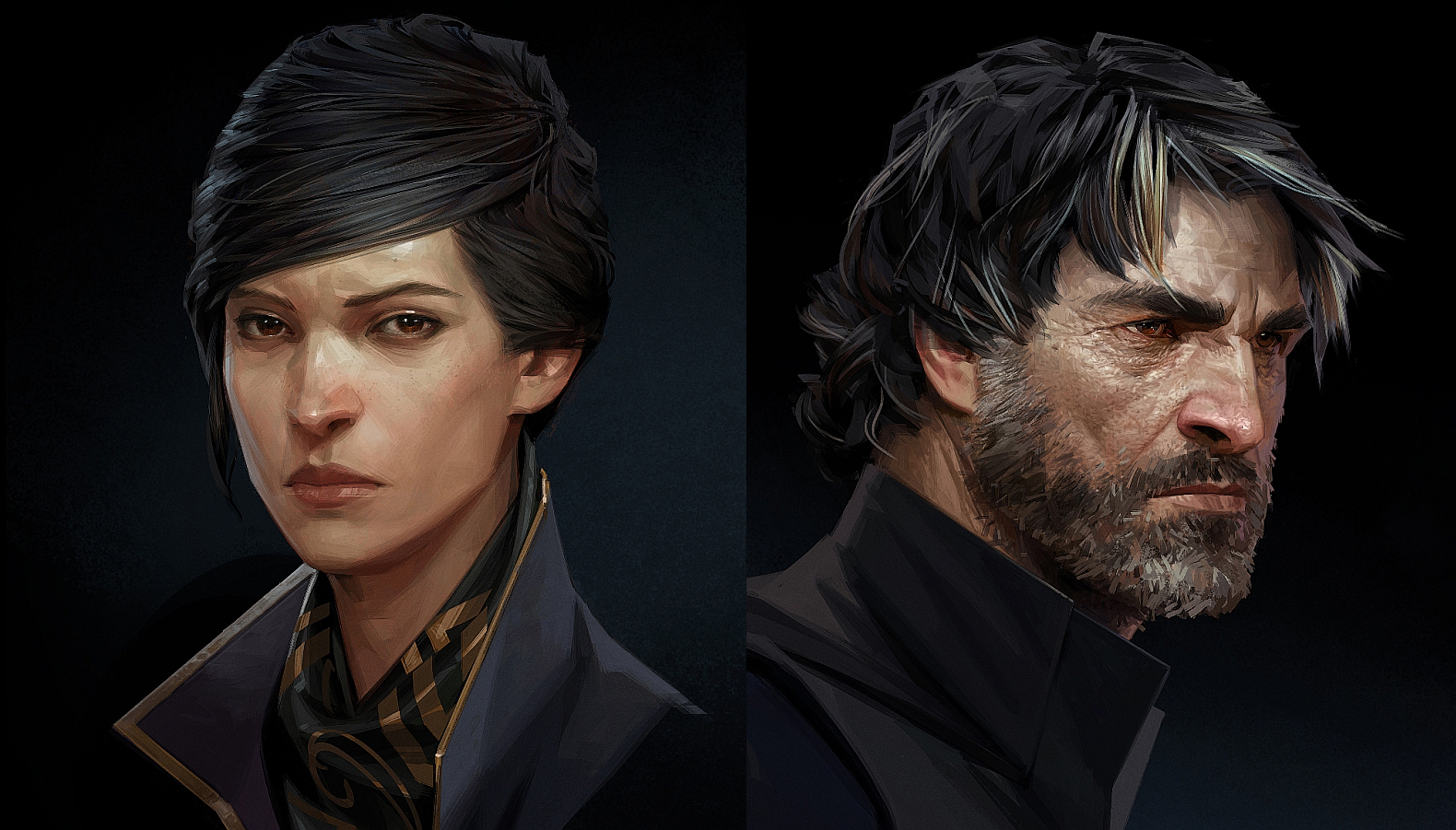Much of the details behind Dishonored 2 is still lurking in the shadows. Luckily, I had the chance to interview the game's Lead Designer Harvey Smith at PAX West 2016 in a quiet room (thank The Outsider) and pry more information about the game's morality, Chaos level, The Outsider, and whether Dishonored would be better as a movie or a TV show.
One of the trademarks of the series is that creating more Chaos by slaughtering enemies and otherwise being a whirlwind of stealthy murder will impact the environment, making the dialogue, cutscenes, and security more dangerous and bloody. Dishonored 2 builds upon the concept by expanding the states from two to three: low Chaos, high Chaos, and "the whole world needs to burn" very high Chaos.
However, one concern is that killing anyone in the game—even, say, a mouth-breathing pedophile—destabilizes the world, and so I asked Smith about the game's non-lethal philosophy:
That's an awesome philosophical question. Our lead designer Dinga Bakaba and I… something that he and I both hold to is that at the end of the day, killing a human being is inherently a negative act.And then you get to the philosophical question [the death penalty idea] about killing Hitler, because then millions of people would have been saved. At the end of the day, we feel like, well, locking Hitler up would have been a more positive action than even killing him because you could have studied him, we could have understood him, prevented future Hitlers, whereas a single bullet wouldn't have done that.
That's where we're coming down philosophically. This is not a game of false equivalency where we're saying, 'This is bad and this is equally bad.' No, no, no, we're saying that the alternate way, not killing human beings leads to a more stable society.
Just like the previous game, you can use The Heart to discover details of each NPC, with some players using what they learn to decide who to kill or not. In Dishonored 2, NPCs are dynamically set to being Sympathetic ("he works an extra shift to feed the homeless kids down the street whose parents have died"), Guilty ("she has another family on the other side of town that nobody knows about"), and Murderous ("she murders all the pensioners who stay in her tenement building and takes their retirement funds"). While the world becomes more Chaotic if you kill the Sympathetic character over the Murderous one, ultimately killing any person destabilizes the world.
Changing the world state by generating Chaos will impact the amount of security and make the game "nastier" as the game progresses. An alternate pathway that has you going through an apartment building might have been clear in a low-Chaos world, but in a high-Chaos or very high-Chaos world, that apartment could be flooded with bloodflies, which lay its eggs in dead bodies. That said, having more bloodflies means that you'll have a higher chance of claiming valuable Blood Ember from their nests.

Another hallmark of the series is The Outsider, an enigmatic figure who lives in the Void that gifts Corvo his abilities (as well as the aforementioned Heart of a living thing) in the first game as well as the empress Emily, whom you can choose to play instead of Corvo at the beginning of Dishonored 2. As Smith expected, The Outsider was a polarizing figure with some fans loving him and some hating him. Dishonored 2 will provide more details on this mysterious godlike character:
Some people mistakenly thought of him as a trickster god or as amoral or indifferent or something, and that's not actually how we present him.This time, we go into his backstory. And we present him as someone who has suffered great abuse in his normal life, his real life, and therefore when he merged with the Void to become godlike in a sense—not omniscient or omnipotent, that would be kind of boring I think—he struggles to maintain some sort of human consciousness probably.
But he ends up picking people who are going to pivotal to large numbers of people, people in history, pivotal in that part of the world, and he kind of anoints them and gives the access to great power. And he fully, cynically expects them to abuse that power and lord it over other people, and when they don't, he's pleasantly surprised. It's such a break from the norm from what he's used to, and so he serves, I feel, like as a thematic touchpoint for the abuse of power.
An aristocrat, to exist, [requires] a thousand people to live in poverty basically for that level of [income disparity]. That means something it's a seesaw, so that's an abuse of power. The guards punching you in the mouth because you've backed up is an abuse of power.
That said, Dishonored 2 will give players the option to actually refuse The Outsider's gift entirely, forcing them to play the game without any magical gifts of any kind:
Our level design director, Christophe Carrier, was really the big proponent of that early on. And I was excited about it too because I really wanted this kind of thing in the first game we did, and in fact we got it so you could take Blink only but nothing else in Dishonored 1. So if you did that and didn't upgrade anything else, we gave you an achievement called Flesh and Steel.But we really wanted to go even further and say you don't even need to have Blink. But it was a huge undertaking for the level designers because you have to make sure that someone can get to every rooftop, every locked office. Casting Emily's shadow walk and going through a rat passage or a rat hole and then coming out, or mashing the windows with Windblast, and possessing a fish and swiming in the fountain – those are the powers way, right? So there's got to be some non-power way to do all of that. It's a complication.
But it's totally possible and interesting, it contextualizes the whole game. The feels different with no powers. You lean, climb, hide over tables, eavesdrop…
In a short interruption, I asked whether the dialogue changes too if you go the non-powers route:
No. There's one or two spots where we change the dialogue. It wasn't our big focus. It already changes depending on whether you use Corvo or Emily, and low or high Chaos, but there's one spot where a dying overseer, since he's on death's door and can see into your heart, and he curses you for being a fiend marked by the Void or whatever. But if you're not marked, he recognizes that, and he basically gives you his blessing. And so that is one of a couple times where we pay off that you are not marked.But the experience itself is so different. It suddenly becomes much more muscular version of Thief somehow, a more muscular version of a stealth game… Viscerally, you have to move through the world, you have to really focus on your hiding, you have to be in the rafters, you have to eavesdrop, you have to drop on people. You don't have the power to bend time or whatever, so it's a different game. It's harder.

Since I didn't have much time left in the interview, I decided to shift gears and ask I larger question. Smith mentioned that he was watching The Americans, The Walking Dead, and Game of Thrones, so I posed the thought of whether he believed Dishonored would be better as an adaptation as a movie, as Assassin's Creed is doing, or as a 10-episode-per-season TV series:
You're singing my song. FIrst of all, I have to say I work very closely with the writers and artists for the comic books and the novel. We have the novel, The Corroded Man, coming out, which is cool, Adam Christopher worked on, and it tells some of the story before the second game. And we also worked on The Wyrmwood Deceit, which is a four-part mini-series in comics. And I really like both of them. Fans are really going to like 'em; there's a lot of fanservice and cohesion with the world. So we are definitely saying, 'Hey, The Empire of the Isles is [a place] that you go deeper with.'That said, I have said over and over to Raph [Lead Designer Raphael Colantonio] inside the company [that] I hope we never have a movie. I hope instead that we have a TV series, because if we ever got lucky and got anything like that—I'm not saying that we are or anything—the depth you can go to with the TV series these days, whether it's like watching The Americans, the time you have to develop the characters and little nuances. And you can do that one-off episode where instead of following the main character, you follow that one overseer who's conflicted because he's in love with his squadmate.
You can do so many deep-detailed things like that. And I would love to see a TV series. That would be cool.







